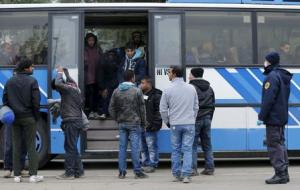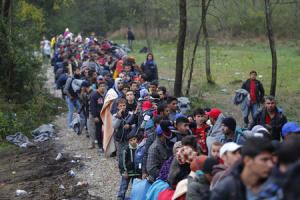Date: Sun, 18 Oct 2015 13:26:19 +0200
By Aleksandar Vasovic
By Aleksandar Vasovic
BERKASOVO, Serbia (Reuters) - A column of around 40 buses packed with migrants queued to enter Croatia from Serbia on Sunday, their passage to western Europe slowed by a new diversion through Slovenia as weather conditions worsen.
Many had spent the night on the buses, wrapped in warm clothes and blankets against the autumn cold. They woke to dense fog.
“This part of the trip has lasted 20 hours, and we’ve been here for almost 12 hours,” said Khair, 40, a former sales manager from the Syrian capital, Damascus. “What can we do? We’re here and we have to wait.”
Hungary sealed its southern border with Croatia to migrants at midnight on Friday, forcing them west to fellow EU member Slovenia, a small former Yugoslav republic of two million people that also borders Austria.
Some 3,000 entered Slovenia on Saturday, en route to Austria and Germany, the favored destination of the vast majority, many of them Syrians fleeing war.
But Slovenian authorities said they planned to limit the influx to around 2,500 per day in line with the country's capacity to register and accommodate them.
That threatened to create a backlog in Croatia and Serbia which in recent weeks have seen upwards of 5,000 crossing their borders every day.
Aid agencies are concerned about backlogs building in the Balkans, lashed by autumn winds and rain and with winter on its way.
Croatia and Slovenia have both said they will not stop migrants from crossing, providing Austria and Germany also keep their doors open.
The EU has agreed a plan, resisted by Hungary and several other ex-Communist members of the bloc, to share out 120,000 refugees among its members.
That is only a small proportion of the 700,000 migrants expected to reach Europe’s shores by boat and dinghy from North Africa and Turkey this year, many of them fleeing war and poverty in the Middle East, Africa and Asia.
The influx has exposed deep divisions within Europe, with Hungary’s right-wing government taking a hard line against mainly Muslim migrants who it says pose a threat to the prosperity, security and “Christian values” of the continent.
The EU has proposed giving Turkey 3 billion euros ($3.4 billion) in aid and the prospect of easier travel visas and “re-energized” talks on joining the bloc if it helps stem the flow across its territory.
(Additional reporting by Marja Novak in LJUBLJANA; Writing by Matt Robinson; Editing by Mark Potter)

